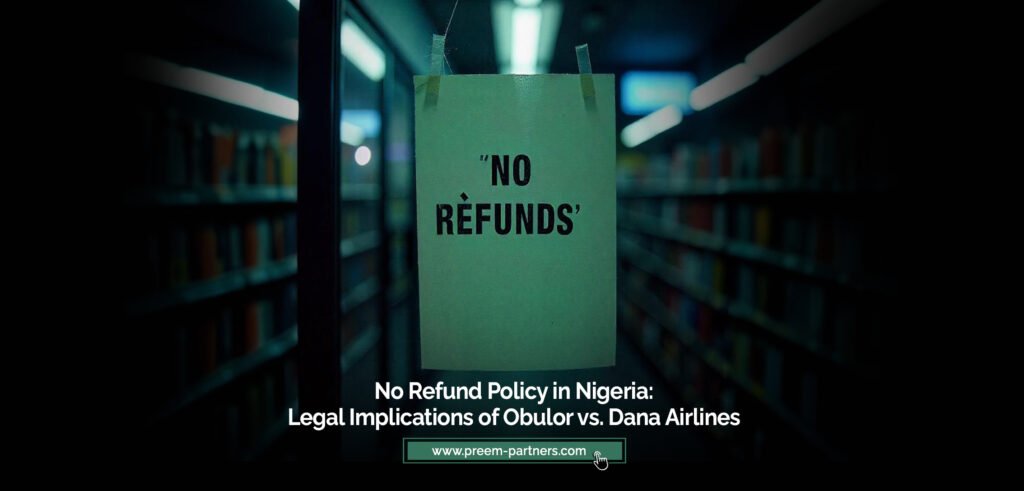
Preem & Partners | 30th April, 2025
It is common practice among Nigerian companies and brands to include a “no refund after payment” clause in their dealings with potential and actual consumers [customers, clients, or users] of their service or product. This often become contentious when the consumer seeks to cancel advance bookings, reservations, or orders for goods or services that have not yet been received or enjoyed. Such clauses are typically referred to as exclusion clauses.
An exclusion clause is a provision inserted into an agreement, usually by the party drafting the contract, with the intent of limiting or excluding liability for certain obligations that would ordinarily require fulfillment. It allows one party to escape liability or deny the other party a remedy in the event of a contractual breach [1].
A recent and relevant example of a “no refund after payment” exclusion clause can be found in the 2023 case of Kezi Best Obulor & Anor v. Dana Airlines Limited [2], though unreported. This case, summarized in this article, offers valuable insight into the legal standing of “no refund” policies in commercial transactions and right of the consumer.
On the 28th of November, 2022, Mr. Nnadum Obulor [the 2nd claimant] – who is a regular customer of Dana Airlines Limited [“Dana”]- booked and reserved a ticket for his sister – Mrs. Best Obulor [the 1st claimant] – with Dana [the defendant] for Dana’s scheduled flight on December 12, 2022 from Port Harcourt to Lagos. On December 5, 2022, Mr. Obulor discovered that he had made a clerical error – instead of booking and reserving the flight in his sister’s name, he reserved it in his name. Mr. Obulor contacted Dana on their customer care line informing them of the clerical error and requested that the ticket be corrected to reflect the name of the Mrs. Obulor, to which Dana refused. Mr. Obulor requested on the alternative that the defendant cancels the reservation and refund the money for the flight. Despite series of mails and correspondences to Dana by Mr. Obulor, Dana insisted that a name change cannot be done on the ticket and neither can a refund be made as the ticket is “non-refundable ticket”.
The claimants issued a formal demand letter to Dana Airlines, requesting a refund and citing relevant provisions of the Federal Competition and Consumer Protection Act, 2018 [“FCCPA 2018”] that support their entitlement to such a refund. Dana Airlines failed to respond or act on the demand, prompting the claimants to file an action at the Rivers State High Court. The case sought a determination on whether Dana’s non-cancellation and non-refund policy violated sections 104, 120(1), 127(1)(c), and 127(2)(a) of the FCCPA 2018. The claimants argued that, under section 120(1) of the FCCPA 2018, they possessed an unrestricted right to cancel an advance booking or reservation—contrary to Dana’s rigid policy against cancellations and refunds.
In its judgment delivered on 31st July 2023, the Rivers State High Court sitting in Port Harcourt held that Dana’s non-cancellation and non-refund policy was illegal and void for contravening the aforementioned provisions of the FCCPA 2018. The Court accordingly ordered Dana Airlines to refund the booking fee and awarded N500,000 in damages to the claimants.
The FCCPA 2018, which was applied by the Rivers State High Court in Obulor vs. Dana above, is the primary legal framework for addressing issues of competition and consumer protection in Nigeria. Section 104 of the Act states thus “Notwithstanding the provisions of any other law but subject to the provisions of the Constitution of the Federal Republic of Nigeria, in all matters relating to competition and consumer protection, the provisions of this Act shall override the provisions of any other law.” The FCCPA 2018 protects consumers’ rights and promotes fair business practices.
No refund policy has been outlawed by the Act, even before the Obulor vs. Dana was decided, in light of the provisions of sections 120, 104, 129 (1) (a) and (b) (iii) of the FCCPA 2018. Section 122 of the FCCPA 2018, for instance, affirms consumers’ right to refunds for defective or substandard products. Businesses found to have illegal non-refund policies may face scrutiny in future contracts.
Non-cancellation and non-refund policies of suppliers and service providers are often stated in the terms of service of such businesses or only orally communicated to the customer or client when the client pushes for a refund. If written in the terms of service and the customer, user, or client proceeds to make payments with knowledge or ignorance of the policy, such becomes a contract that is ordinarily binding on the customer, user, or client. However, because non-refundable policies are unlawful, they are illegal and have no effect even if they are present in the terms of service of the service provider or supplier. There are generally referred to as “illegal contracts” and cannot be enforced against a customer, user, or client. If anything, the case of Alex O. Onwuchekwa v. Nigeria Deposit Insurance Corporation [3] underscores the fundamental principle that courts will not enforce contracts tainted by illegality, reaffirming the importance of legality in contractual dealings.
The law on the illegality of non-refund policy has been applied in several cases before Obulor’s. One of such is Patrick Chukwuma v. Peace Mass Transit Ltd [4], where the Enugu State High Court ordered Peace Mass transport company to pay the sum of N500,000 as damages to Mr. Chukwuma who personally cancelled his ticket to Enugu from the Obollor-Afor due to the company’s two hours delay in movement and the transport company refused to make a N500 refund despite requests, citing its “no refund policy”. Also, in October 2022 in the case of Edem Ekeng & Anor v. Wakanow.com Limited [5], the Lagos State Magistrates’ Court ordered Wakanow – a travel agency – to refund Mr. Ekeng’s flight ticket sum to London when Wakanow failed to provide services as agreed and paid for with regards to several international tickets in 2016 and denied refunds citing its “no refund policy”.
Obulor’s case highlights the diverse rights of consumers as enshrined in the FCCPA 2018. A major challenge faced by most consumers is how to enforce their rights when there is a wrong. For some consumers, they do not even know their rights. For instance, Section 120(1) (2) and (3) of the FCCPA 2018 provides that customers have a right to cancel bookings, orders and reservations and the companies may charge a reasonable cancellation fee for any inconvenience that may cause. We take the liberty to reproduce sub-section (1) here: “A consumer shall have the right to cancel any advance booking, reservation or order for any goods or services, subject to a reasonable charge for cancellation of the order or reservation by the supplier or service provider”.
However, the service provider or supplier is authorized to waive any cancellation fee if the reason for the cancellation is the death or hospitalization of the customer or intended beneficiary. If cancellation fee applies, the fee is to be determined and measured by four factors:
This means that transportation companies—including airlines and land transport operators—alongside e-commerce platforms, retail businesses, professional service providers, and other service-based entities, cannot lawfully deny refunds to customers, users, or clients who decide not to proceed with their initial bookings or orders, provided that the goods or services have not yet been supplied or delivered.
Failure to comply with this legal obligation may result in courts awarding refunds or damages to affected consumers. The decision in Obulor vs. Dana Airlines Limited and similar cases reinforce the provisions of the FCCPA 2018, making it clear that any “no refund” policy is unlawful, invalid, null, and of no legal effect. This serves as a reminder that consumers have enforceable rights to refunds and compensation for any inconvenience caused by such policies. It also signals a need for corporate entities to carefully review and align their refund policies with applicable consumer protection laws.
“No refund” policies have increasingly become a shield for businesses, often leaving consumers disadvantaged—often when goods or services fall short of expectations or when the consumers cannot, for genuine reasons, proceed to receive the goods or service ordered. Although the FCCPA 2018 prohibits business practices that impose unfair, unreasonable or unjust terms on consumers and explicitly invalidating no refund policies, the case of Obulor vs. Dana reiterates this position of the law in protecting the consumer from unfair and unconscionable terms. This extends to any undertakings consumers are pressured to sign in an attempt to shield service providers from liability. [6]
Flowing from this precedent, it is evident that “no refund” policies as an exclusion clause in contractual terms in Nigeria are not only unfair but also illegal, unjustifiable, and contrary to civilised business practices. The insistence on denying refunds after payment reflects a culture of impunity among some service providers.
Businesses must ensure compliance with the FCCPA 2018 to avoid unnecessary legal and financial risks, while consumers must remain aware of their rights and take appropriate legal action when those rights are violated —just like Mr. Obulor and his sister did.
Lookups
